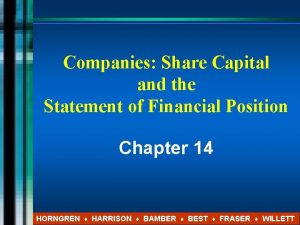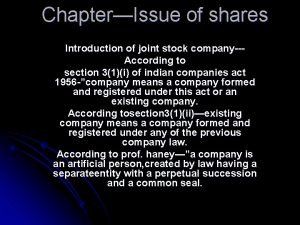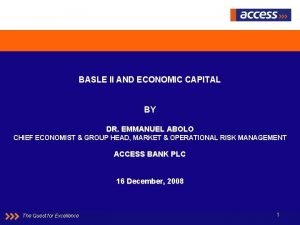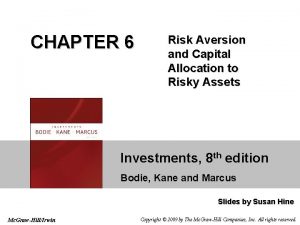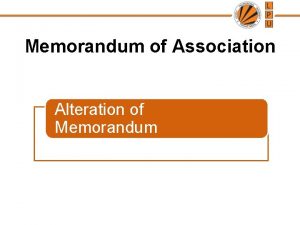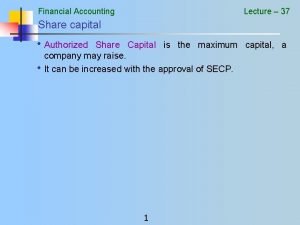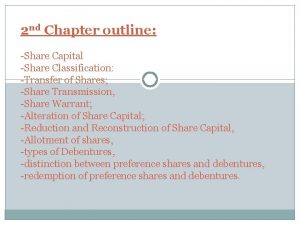Share Capital Alteration of capital i Share Capital






















- Slides: 22

Share Capital + Alteration of capital

(i) Share Capital : Meaning Share Capital means the capital raised by a company by the issue of shares. (ii) Share : Meaning (means a share in the share capital and includes stock ) stock means total capital aggregate of fully paid up shares A share (unit of ownership) is the interest of a shareholder in the company. (iii) Share Certificate : Meaning A certificate issued under the common seal of the company, specifying the number of shares held by the person shall be prima facie evidence of title of the person to such shares.

• Transmission of Shares: A transmission of interest in shares of a company, of a deceased member of the company, made by the legal representative of a deceased member shall be considered as transmission of shares by operation of law. This transmission will be registered by a company in the Register of Members. • Transfer of shares

Types of Capital: 1. Authorised or Nominal Capital -nominal value of shares - maximum capital a company can have during its lifetime - mentioned in Mo. A 2. Issued Capital and Unissued Capital - nominal value of shares issued to the public - can never exceed authorized capital 3. Subscribed Capital and Unsubscribed 4. Called-up Capital - part of Issued Capital 5. Uncalled Capital - subject to terms of issue of shares and provisions of articles 6. Reserved Capital - called only in the event of winding up (done by special resolution) 7. Paid-Up Capital 8. Unpaid up capital/ Call in Arrears http: //www. indiastudychannel. com/resources/109378 -What-Share-Capital. aspx

Types of Share Capital: (2015 edition) The share capital of a company limited by shares is of 2 kinds: (a) Equity share capital ( w. r. t company limited by shares, means all share capital which is not preference share capital) - with voting rights - with differential rights as to dividend, voting or otherwise Meaning: Shares that carry no preferential or special rights in respect of annual dividends (but paid out of profits after preference shareholders)and in the repayment of capital at the time of liquidation of the company are called equity shares. Also called common stock or ordinary shares.

contd. . . . Types of Share Capital: (2015 edition) (b) Preference share capital w. r. t company limited by shares, means that part of issued share capital which carries or would carry a preferential right in terms of - payment of dividend , either fixed or amount @ a fixed rate (either free of or subject to income-tax - repayment in the case of winding up or repayment of share capital paid-up or deemed to have been paid-up, whether or not, there is preferential right to the payment of any fixed premium specified in memorandum and articles of the company.

Kinds : Preference Shares (2014 edition) 1. 2. 3. 4. 5. 6. 7. Cumulative Preference Shares Non- Cumulative Preference Shares Participating Preference Shares Non-participating Preference Shares Convertible preference Shares Non-convertible Preference shares Redeemable preference shares

• Cumulative preference shares: In case the company has not been able to pay part or all of the annual dividends because of insufficient profit, the unpaid amount is carried forward to future years and made good when the company has sufficient profit to pay the dividends. These type of shares are called cumulative preference shares. • Non-Cumulative preference shares: those type of preference shares, which have right to get fixed rate of dividend out of the profits of current year only. They do not carry the right to receive arrears of dividend.

• Redeemable preference shares: These are preference shares that the company will buy back at an agreed date in the future. They are classified as non-current liabilities in the statement of financial position of a company. • Irredeemable preference shares: those that will not be bought back by the company. Shareholders will continue to earn dividends as long as profit is earned. They are listed under heading equity in the statement of financial position of a company.

Note : 1. No company limited by shares shall, after the commencement of this Act, issue any preference shares which are irredeemable. 2. A company limited by shares may, if so authorised by its articles, issue preference shares which are liable to be redeemed within a period not exceeding twenty years from the date of their issue subject to such conditions as may be prescribed: Provided that a company may issue preference shares for a period exceeding twenty years for infrastructure projects, subject to the redemption of such percentage of shares as may be prescribed on an annual basis at the option of such preferential shareholders.

• Participating Preference Shares: Those preference shares, which have right to participate in any surplus profit of the company after paying the equity shareholders, in addition to the fixed rate of their dividend, are called participating preference shares. or Non-participating Preference Shares: Those preference shares which do not carry the right of share in excess profits.

• Convertible Preference Shares: Those preference shares, which can be converted into equity shares at the option of the holders after a fixed period according to the terms and conditions of their issue, are known as convertible preference shares. • Non-convertible Preference Shares: Which preference shares are not convertible into equity shares are known as non convertible preference shares

Share Warrant : A share warrant is a bearer document of title to shares and can be issued only by public limited companies and that to against fully paid up shares only. - negotiable - entitled to receive dividend as decided by the company. Calls on shares: A call is demand by a company on its shareholders to pay the whole or part of the balance remaining unpaid on each share (made anytime during the lifetime of the company or winding up) - depends upon Boards resolution - terms of articles

Lien on shares: - A company has right to retain all shares (not being fully paid up) for amounts payable on the shares or any amount due from the estate of shareholders until the claim attaching to it is settled. - should be mentioned in the articles and safe to adopt - it extends to all dividends - continues even after the death of shareholders Forfeiture on shares: If a shareholder having been called upon to pay any call on his shares, fails to pay the call, the company can: (i) sue him for the due amount (ii) forfeit his shares i. e depriving a person of his property as a penalty for some act or omission

Alteration of Capital (2015 edition) Power to alter capital : A limited company having a share capital may, if so authorised by its articles, alter its share capital as follows by passing an ordinary resolution: (a) Increase its authorised share capital by issuing new shares (b) Consolidate and divide all or any of its share capital into shares of larger amount than its existing shares; (if voting % age of shareholders change, Tribunal’s approval on an application is required) (c) convert all or any of its fully paid-up shares into stock, and reconvert that stock into fully paid-up shares of any denomination; (d) sub-divide its existing shares or any of them into shares of smaller amount than is fixed by the memorandum; (e) cancel any shares which, at the date of the passing of the resolution, have not been taken or agreed to be taken by any person. NOTE : 1. the cancellation of shares shall not be deemed to be reduction of share capital 2. Notice of alteration to be given to the Registrar within 30 days from doing so.

(A) Reduction of Capital (with the consent of the Tribunal): (Sec 66) from mca website (I) A company limited by shares/limited by guarantee having share capital may by a special resolution reduce the capital alter its memorandum subject to confirmation by the Tribunal in ways : (i) It may extinguish or reduce the liability on any of its shares in respect of share capital not paid-up e. g no requirement of uncalled capital (ii) It may, either with or without extinguishing or reducing liability on any of its shares: - cancel any paid-up share capital which is lost or is unrepresented by available assets. e. g share of Rs. 10 converted to Rs. 2 fully paid up (due to heavy losses) - pay-off any paid-up share capital which is in excess of the wants of the company. e. g Out of Rs. 10 share, Rs. 4 each share is returned and Rs. 6 would be fully paid up or it will remain same. Examples in red colour are from 2014 book edition

(II) The Tribunal shall give notice of every application made to it : - to the Central Government, Registrar and to the Securities and Exchange Board, in the case of listed companies, and the creditors of the company and shall take into consideration the representations, if any, made to it by that Government, Registrar, the Securities and Exchange Board and the creditors within a period of three months from the date of receipt of the notice: Provided that where no representation has been received from the Central Government, Registrar, the Securities and Exchange Board or the creditors within the said period, it shall be presumed that they have no objection to the reduction. - The Tribunal may, if it is satisfied that the debt or claim of every creditor of the company has been discharged or determined or has been secured or his consent is obtained, make an order confirming the reduction of share capital on such terms and conditions as it deems fit: - No application for reduction of share capital shall be sanctioned by the Tribunal unless the accounting treatment, proposed by the company for such reduction is in conformity with the accounting standards and a certificate to that effect by the company’s auditor has been filed with the Tribunal.

(III) The order of confirmation of the reduction of share capital by the Tribunal shall be published by the company in such manner as the Tribunal may direct. (IV) The company shall deliver a certified copy of the order of the Tribunal and of a minute approved by the Tribunal showing— (a) the amount of share capital; (b) the number of shares into which it is to be divided; (c) the amount of each share; and (d) the amount, if any, at the date of registration deemed to be paid-up on each share, to the Registrar within thirty days of the receipt of the copy of the order, who shall register the same and issue a certificate to that effect. (V) A member of the company, past or present, shall not be liable to any call or contribution in respect of any share held by him exceeding the amount of difference, if any, between the amount paid on the share, or reduced amount, if any, which is to be deemed to have been paid thereon, as the case may be, and the amount of the share as fixed by the order of reduction.

(VI) If any officer of the company— (a) knowingly conceals the name of any creditor entitled to object to the reduction; (b) knowingly misrepresents the nature or amount of the debt or claim of any creditor; or (c) is privy to any such concealment or misrepresentation as aforesaid, he shall be liable under section 447. (VII) If a company fails to comply with the provisions mentioned, it shall be punishable with fine which shall not be less than five lakh rupees but which may extend to twenty-five lakh rupees.

Procedure for reduction of share capital : (in brief) – 2014 edition book (Briefly) 1. Special Resolution - pass a special resolution - should be allowed in Ao. A - if Ao. A, doesn’t allow then alter the Ao. A by passing a special resolution 2. Application to the Court - Interest of Creditors - Interest of Shareholders 3. Registration of order of Tribunal with the Registrar (within thirty days of the receipt of the copy of the order) - certified order by court is submitted - approved minute by the court to be attached showing (i) amount of share capital (ii) no. of shares into which it is to be divided (iii) amount of each share (iv) the amount, if any, at the date of registration deemed to be paid on each share

4. When registration takes effect - after registration by Registrar - Notice of registration in a way court directed 5. Certificate of registration by Registrar The minute when registered , shall be deemed to be substituted for the corresponding part of the Memorandum and shall be valid and alterable as if it had been originally contained therein.

Reduction of Capital without the Sanction of the Court (2014 book edition) It can take place by : 1. Forfeiture of Shares (leads to reduction if not re-issued) 2. Surrender of Shares ( means shareholder voluntarily gives up his shares in favour of the company) 3. Cancellation of Shares (cancel the shares which have not been taken) 4. Purchase of shares by the company (court may order) 5. Redemption of redeemable preference shares 6. Buy-back of shares (means company can purchase its own shares or other specified securities by using its - free reserves - securities premium account - proceeds of an earlier issue other then fresh-issued for buy back )
 Alteration of share capital
Alteration of share capital Paid up capital
Paid up capital Alteration in various aspects of society over time
Alteration in various aspects of society over time Strata lot
Strata lot Form 337 vs stc
Form 337 vs stc Aeg stade oms
Aeg stade oms Permanent alteration
Permanent alteration Feed enzyme
Feed enzyme Chemical alteration definition
Chemical alteration definition Lig flavum
Lig flavum Faktor faktor yang mempengaruhi perubahan
Faktor faktor yang mempengaruhi perubahan Alteration in urinary elimination
Alteration in urinary elimination Chapter 46 the child with a cardiovascular alteration
Chapter 46 the child with a cardiovascular alteration Www.youtube.com
Www.youtube.com Total share capital
Total share capital Constant capital and variable capital
Constant capital and variable capital Difference between capital reserve and reserve capital
Difference between capital reserve and reserve capital Multinational cost of capital and capital structure
Multinational cost of capital and capital structure Working capital introduction
Working capital introduction Basle ii
Basle ii Capital allocation line vs capital market line
Capital allocation line vs capital market line Difference between capital reserve and reserve capital
Difference between capital reserve and reserve capital Regulatory capital vs economic capital
Regulatory capital vs economic capital














